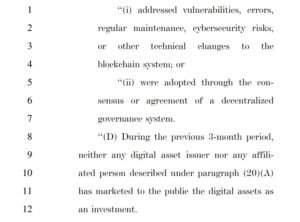The US House of Representatives passed the Financial Innovation and Technology for the 21st Century Act on Wednesday, establishing a new legal framework for cryptocurrencies. The bill, which garnered bipartisan support with a 279-136 vote, aims to provide regulatory clarity and foster industry growth. Despite its approval in the House, the bill’s future in the Senate remains uncertain, and it faces strong opposition from the Securities and Exchange Commission (SEC).

US SEC’s Opposition
SEC Chairperson Gary Gensler has been vocal about his concerns regarding the bill. He warned that it could create significant regulatory gaps and undermine decades of precedent in overseeing investment contracts. According to Gensler, this change would place investors and capital markets at considerable risk. He cited numerous high-profile cases of fraud, bankruptcies, and failures within the cryptocurrency sector as evidence of the need for stringent regulation.
Gensler’s primary objection is that the bill would classify cryptocurrencies as commodities rather than securities. This reclassification would reduce the SEC’s oversight and potentially remove vital investor protections provided by securities laws. Gensler criticized the bill for allowing issuers of crypto investment contracts to self-certify their products as digital commodities. This process would leave the SEC only 60 days to challenge these claims, a timeframe Gensler argues is insufficient to ensure proper oversight.
Proponents of the crypto bill in US

Supporters of the bill, predominantly Republicans, argue that the existing regulations are outdated and hinder innovation in the rapidly evolving crypto industry. They believe that the new framework will provide much-needed clarity, attract investment, and promote the growth of the digital asset sector. They contend that the SEC’s traditional disclosure regimes are impractical for the unique nature of cryptocurrencies and that the Commodity Futures Trading Commission (CFTC) should have primary regulatory responsibility.
Nischal Shetty, Cofounder of Shardeum, lauded the bill as a significant win for the Web3 ecosystem. He believes that the regulatory clarity provided by the bill will drive wider crypto adoption and expand the Web3 landscape, integrating crypto assets with traditional markets. Shetty emphasized the importance of education and development within the Web3 sector to capitalize on this momentum, especially in countries like India.
Avinash Shekhar, Cofounder & CEO of Pi42, echoed this sentiment, calling the bill’s passage a watershed moment for the crypto industry. He sees it as a crucial step toward supporting the growth and maturation of the digital asset ecosystem in the US while protecting consumers and maintaining market integrity. Shekhar highlighted the bill’s role in clarifying the regulatory responsibilities of the SEC and CFTC, which he believes will benefit the industry.
SEC’s Position and Industry Impact
The House approval of the bill coincides with the SEC indicating it may approve applications for spot ether exchange-traded funds (ETFs), which has been a surprising boost for the industry. However, Gensler reiterated his stance that cryptocurrencies should be subject to the same laws as other assets. He expressed concern that the bill would exempt certain crypto investment contracts from securities laws, leaving investors vulnerable to fraud and manipulation.
Gensler’s statement underscores the ongoing tension between crypto proponents and regulators. The industry has long viewed the SEC’s rigorous oversight as a barrier to wider adoption of digital assets. The bill’s proponents argue that it would foster innovation by providing a more tailored disclosure and registration regime for digital asset companies.
Political and Market Reactions
 The bill’s passage in the House comes at a pivotal moment for the crypto industry. Market sentiment has been buoyed by the potential approval of spot ether ETFs by the SEC. ETH prices surged by 22%, with significant inflows into exchanges and a notable short squeeze impacting the market.
The bill’s passage in the House comes at a pivotal moment for the crypto industry. Market sentiment has been buoyed by the potential approval of spot ether ETFs by the SEC. ETH prices surged by 22%, with significant inflows into exchanges and a notable short squeeze impacting the market.
On the political front, former President Donald Trump’s campaign announced it would begin accepting cryptocurrency donations. This move is seen as an effort to appeal to younger voters who are increasingly involved in digital assets. The campaign is accepting a range of cryptocurrencies, including Bitcoin, Ether, and various other popular and lower-value coins.
The Financial Innovation and Technology for the 21st Century Act represents a significant shift in the regulatory landscape for cryptocurrencies in the US. While it promises to provide regulatory clarity and promote industry growth, it faces significant opposition from the SEC and an uncertain future in the Senate. The ongoing debate highlights the challenges regulators face in adapting to the novel and rapidly evolving crypto sector. Whether the bill will become law and how it will impact the industry remains to be seen.











